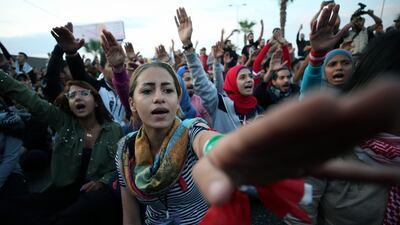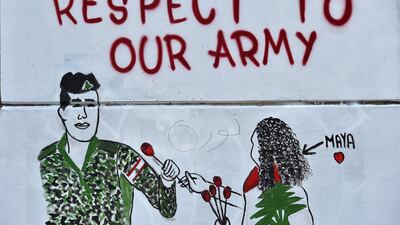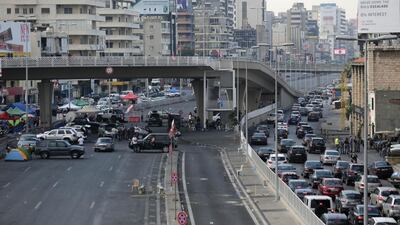The governor of Lebanon’s central bank on Monday called for an urgent solution to the country’s economic crisis to prevent a future collapse.
Riad Salameh warned that the economy was “days” from collapse and called for a rapid change in government to satisfy protesters who have filled the streets for 12 days, forcing banks to close.
In unusually strong comments, Mr Salameh told CNN a change in government was needed to restore confidence and ensure that money coming in from Lebanese expatriates did not dry up.
But Mr Salameh later eased back on some of his comments.
"I am not saying that we are going to have a collapse in a matter of days," he said.
"I am saying we need to have a solution in a matter of days to regain confidence and avoid collapse in the future."
Mr Salameh said the local currency's peg to the dollar would be maintained and that when banks in Lebanon reopened, "there is no capital control and no haircut".
He had earlier said: “It’s a matter of days because the cost is heavy on the country.
“But more important we’re losing every day more and more confidence. And finance and the economy is all about confidence."
Schools, banks and most businesses remained closed on Monday, raising concerns that many Lebanese would not be able to receive their salaries at the end of the month.
There are also fears of a run on the banks that could further deplete the country’s limited supply of foreign currency, affecting its ability to import wheat, fuel and medicine.
The Association of Banks in Lebanon said banks would remain closed on Tuesday for a 13th consecutive day “in light of the continuation of popular movements and awaiting the stabilisation of general conditions".
But the banks said they were determined to pay public sector salaries, especially to members of the security forces, and had enough liquidity to do it.
In the latest sign of crisis, ATMs have mostly stopped dispensing US dollars, which have long been a widely accepted second local currency.
That has added to concerns that the government may no longer be able to maintain a fixed rate of exchange with the Lebanese pound.
Long before the protests began, the country’s economy was already suffering from a massive budget deficit and rising unemployment.
Its debt ratio of $86 billion (Dh315.8bn) is one of the highest in the world, accounting for more than 150 per cent of gross domestic product.
The protesters blame the economic crisis on political leaders from various religious sects and factions who have dominated the country since the civil war.
They say the sectarian power-sharing arrangement that ended the war brought networks of corruption, patronage and nepotism that depleted the treasury and gutted public services.
Ultra processed foods
- Carbonated drinks, sweet or savoury packaged snacks, confectionery, mass-produced packaged breads and buns
- margarines and spreads; cookies, biscuits, pastries, cakes, and cake mixes, breakfast cereals, cereal and energy bars;
- energy drinks, milk drinks, fruit yoghurts and fruit drinks, cocoa drinks, meat and chicken extracts and instant sauces
- infant formulas and follow-on milks, health and slimming products such as powdered or fortified meal and dish substitutes,
- many ready-to-heat products including pre-prepared pies and pasta and pizza dishes, poultry and fish nuggets and sticks, sausages, burgers, hot dogs, and other reconstituted meat products, powdered and packaged instant soups, noodles and desserts.
F1 The Movie
Starring: Brad Pitt, Damson Idris, Kerry Condon, Javier Bardem
Director: Joseph Kosinski
Rating: 4/5
Conflict, drought, famine
Estimates of the number of deaths caused by the famine range from 400,000 to 1 million, according to a document prepared for the UK House of Lords in 2024.
It has been claimed that the policies of the Ethiopian government, which took control after deposing Emperor Haile Selassie in a military-led revolution in 1974, contributed to the scale of the famine.
Dr Miriam Bradley, senior lecturer in humanitarian studies at the University of Manchester, has argued that, by the early 1980s, “several government policies combined to cause, rather than prevent, a famine which lasted from 1983 to 1985. Mengistu’s government imposed Stalinist-model agricultural policies involving forced collectivisation and villagisation [relocation of communities into planned villages].
The West became aware of the catastrophe through a series of BBC News reports by journalist Michael Buerk in October 1984 describing a “biblical famine” and containing graphic images of thousands of people, including children, facing starvation.
Band Aid
Bob Geldof, singer with the Irish rock group The Boomtown Rats, formed Band Aid in response to the horrific images shown in the news broadcasts.
With Midge Ure of the band Ultravox, he wrote the hit charity single Do They Know it’s Christmas in December 1984, featuring a string of high-profile musicians.
Following the single’s success, the idea to stage a rock concert evolved.
Live Aid was a series of simultaneous concerts that took place at Wembley Stadium in London, John F Kennedy Stadium in Philadelphia, the US, and at various other venues across the world.
The combined event was broadcast to an estimated worldwide audience of 1.5 billion.
UAE currency: the story behind the money in your pockets
Other acts on the Jazz Garden bill
Sharrie Williams
The American singer is hugely respected in blues circles due to her passionate vocals and songwriting. Born and raised in Michigan, Williams began recording and touring as a teenage gospel singer. Her career took off with the blues band The Wiseguys. Such was the acclaim of their live shows that they toured throughout Europe and in Africa. As a solo artist, Williams has also collaborated with the likes of the late Dizzy Gillespie, Van Morrison and Mavis Staples.
Lin Rountree
An accomplished smooth jazz artist who blends his chilled approach with R‘n’B. Trained at the Duke Ellington School of the Arts in Washington, DC, Rountree formed his own band in 2004. He has also recorded with the likes of Kem, Dwele and Conya Doss. He comes to Dubai on the back of his new single Pass The Groove, from his forthcoming 2018 album Stronger Still, which may follow his five previous solo albums in cracking the top 10 of the US jazz charts.
Anita Williams
Dubai-based singer Anita Williams will open the night with a set of covers and swing, jazz and blues standards that made her an in-demand singer across the emirate. The Irish singer has been performing in Dubai since 2008 at venues such as MusicHall and Voda Bar. Her Jazz Garden appearance is career highlight as she will use the event to perform the original song Big Blue Eyes, the single from her debut solo album, due for release soon.
Lexus LX700h specs
Engine: 3.4-litre twin-turbo V6 plus supplementary electric motor
Power: 464hp at 5,200rpm
Torque: 790Nm from 2,000-3,600rpm
Transmission: 10-speed auto
Fuel consumption: 11.7L/100km
On sale: Now
Price: From Dh590,000
Squid Game season two
Director: Hwang Dong-hyuk
Stars: Lee Jung-jae, Wi Ha-joon and Lee Byung-hun
Rating: 4.5/5
More from Neighbourhood Watch:
Washmen Profile
Date Started: May 2015
Founders: Rami Shaar and Jad Halaoui
Based: Dubai, UAE
Sector: Laundry
Employees: 170
Funding: about $8m
Funders: Addventure, B&Y Partners, Clara Ventures, Cedar Mundi Partners, Henkel Ventures










